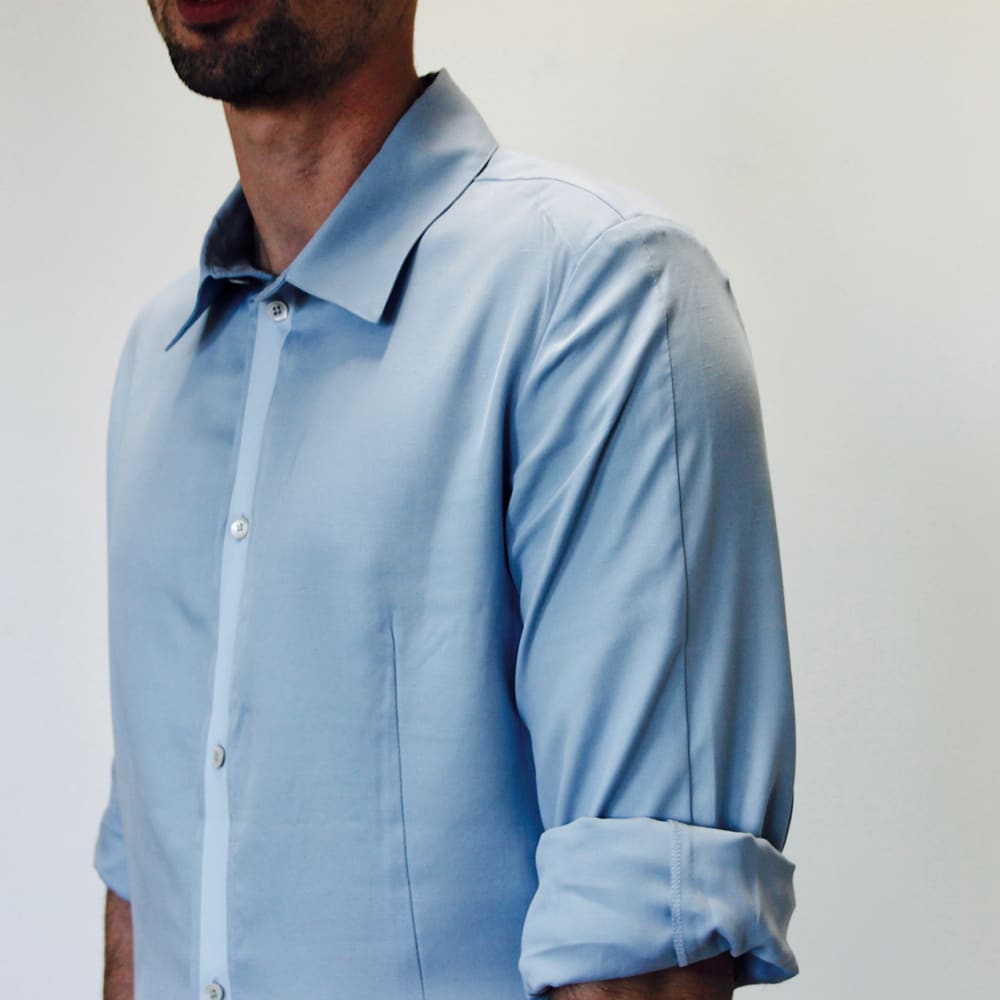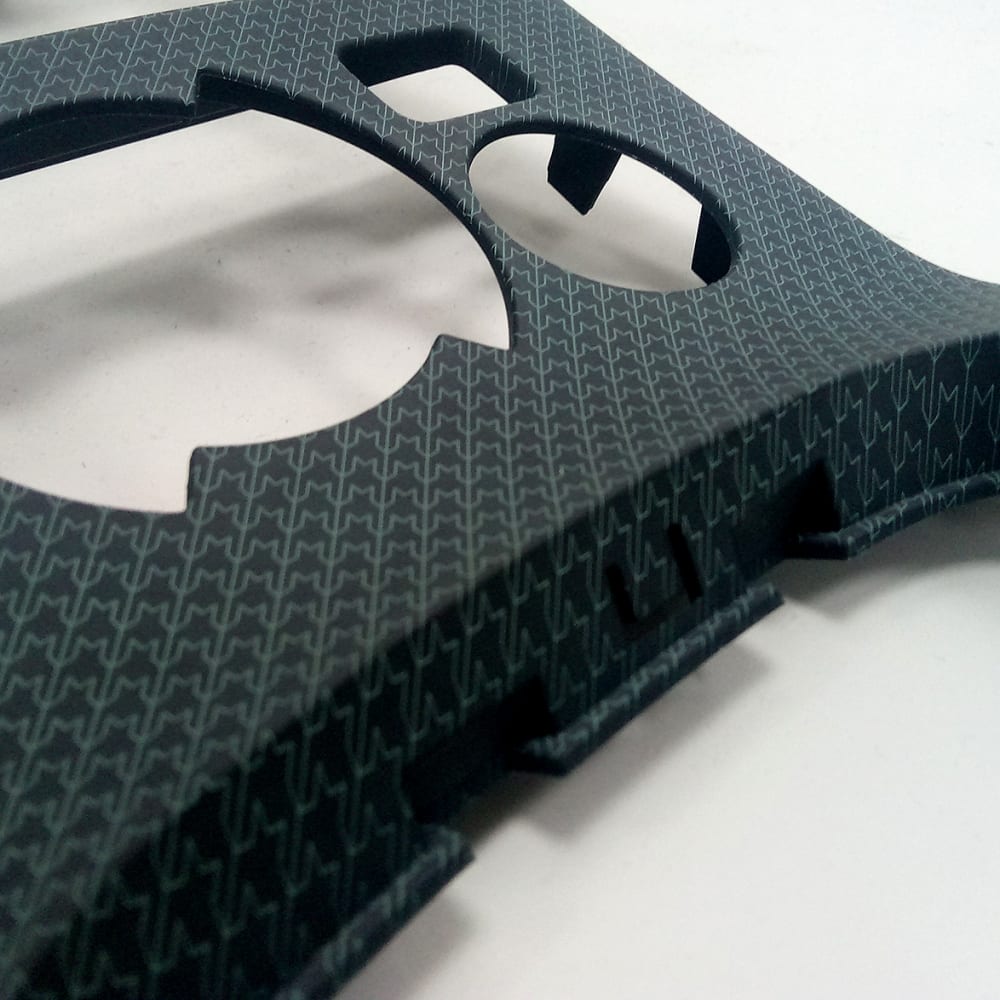Designed, high-value products from zero-value waste textiles and fibres via design driven technologies.

Project summary
Funding period: June 2015 - November 2018
Funding type: Innovation Action
Funded by: European Commission - Horizon 2020
Lead partner: RISE Research Institutes of Sweden
Trash-2-Cash responded to the problem of textile waste in the European Union. The project explored how high-quality regenerated materials could be co-created using 3 emerging recycling technologies.
The approach brought together design, science and industry partners. A novel design-driven methodology was also developed. A timely, yet complex challenge, circular design concepts informed the materials development in an iterative co-design process to produce 6 exemplar product prototypes.
Outcomes
- Integration of design, business and technology approaches into a coherent methodology to help shape future collaborative research projects.
- Development of new material and product opportunities via creative design from waste or process by-products through ‘Design-Driven Material Innovation (DDMI)'.
- Integration of environmental assessment into the design process through ‘Collaborative Circular Design’ methods.
- Application of design for recycling principles with the vision of closing the material loop, improving material efficiency, reducing landfill volumes and energy consumption.
- Creation of new business opportunities in the return loop of discarded goods through recycling into commercially viable products.
Prototypes
R3 coat
Using the ‘de-polymerisation–re-polymerisation’ technology, the Trash-2-Cash scientists produced recycled polyester fibres from blended polyester-cotton and pure polyester waste textiles. From these fibres, a high-performing and printable textile was manufactured. Project scientists adapted a self-healing material usually used to make sealants for the aerospace industry to make it waterproof. Breathability was achieved by laser-cutting tiny air holes into the fabric. The coats are intended to be part of a rental business model that allows them to be properly recycled at the end of life.
0° shirt
As its name suggests, the shirt was designed to have as close to zero impact on the environment as possible. Trash-2-Cash scientists used a low-impact method to regenerate waste cotton into new Ioncell-F fibres. Instead of bleaching away the colour, it was left in, meaning that the blue textiles that went into the process produced pale blue fibres. These were woven by Trash-2-Cash manufacturers into a soft fabric with a beautiful drape that was transformed by designers in the project using zero-waste pattern-cutting techniques to ensure there were no offcuts left from the tailored shirt.
Reborn - reworn
Trash-2-Cash fibre scientists were able to modify the Ioncell-F technology to regenerate cotton waste into new, super-fine fibres that replicate the softness of polyester fleece but without the plastic pollution. The manufacturers knitted and brushed the biodegradable fabric to produce a super-soft natural fleece-like fabric perfect for a baby. The non-bleached, colour-retaining technology also used in the 0° shirt was used again here, making this a super-low-impact alternative to polyester fleece.
Denim NAture jeans
Trash-2-Cash fibre scientists discovered a sustainable method for separating polyester and cotton so that the fibres can be reused. Some of that polyester can also be made into a stretchy alternative to elastane, meaning that the denim NAture jeans are made from waste materials but can also be recycled (unlike elastane that pollutes the fibre regeneration process). To prolong their useful life patch repair kits and a free end-of-life collection service would be provided with the garment.
ReAct mid-layer
To create a cool, moisture-wicking, Ioncell-F fabric from waste cotton, Trash-2-Cash fibre scientists made the fabric ‘hydrophobic’, by using a breakthrough technology that put the moisture management properties directly into the fibres at a molecular level. This technology negated the need for the fabric to go through additional chemical treatment.
Fashion fascia
Trash-2-Cash scientists and designers explored a variety of material innovations using T2C recycled polymers and fibres, laser etching, an innovative recyclable epoxy resin and textile print design for car interiors. These prototypes vastly improved the aesthetic of recycled materials which has long been a barrier for their use in the automotive industry.
Project team
- Professor Rebecca Earley - Principal Investigator
- Professor Kate Goldsworthy - Co-Investigator
- Dr Rosie Hornbuckle - Research Fellow
- Dr Dawn Ellams - Research Fellow



Related links
Outputs
- Östmark, Emma and Niinimäki, Kirsi and Markaide, Nerea and Gwozdz, Wencke and Cozzoni, Enrico and Tubito, Christian and Wedin, Helena and Earley, Rebecca and Harlin, Ali and Määttänen, Marjo and Henriksson, Marielle (2016) Trash-2-Cash Project: First Milestone Report D9.2. Project Report. Trash-2-Cash Project.
- Goldsworthy, Kate and Ellams, Dawn (2019) Collaborative Circular Design: Incorporating Life Cycle Thinking into an Interdisciplinary Design Process. The Design Journal, 22 (Sup1). pp. 1041-1055. ISSN 1756-3062
- Earley, Rebecca (2019) Building Bridges: Design Researchers Making Podcasts to Support Internal Collaboration in an EU Horizon 2020 Scientific Programme. In: The Design Journal. Taylor & Francis, pp. 1057-1070.
- Tubito, Christian and Earley, Rebecca and Ellams, Dawn and Goldsworthy, Kate and Hornbuckle, Rosie and Niinimäki, Kirsi and Östmark, Emma and Sarbach, Veronica and Tanttu, Marjaana (2019) Applied DDMI: A White Paper on how Design-Driven Material Innovation Methodology was applied in the Trash-2-Cash Project. Project Report. Trash-2-Cash.
- Östmark, Emma and Elin, Ilena and Markaide, Nerea and Gwozdz, Wencke and Cozzoni, Enrico and Tubito, Christian and Wedin, Helena and Earley, Rebecca and Harlin, Ali and Määttänen, Marjo and Henriksson, Marielle and Johansson, Niklas (2017) Trash-2-Cash Project: Second Milestone Report D9.3. Project Report. Trash-2-Cash Project.
- Östmark, Emma and Ilen, Elina and Boucher, Virginie and Gwozdz, Wencke and Cozzoni, Enrico and Tubito, Christian and Henriksson, Marielle and Wisniewski, Roger and Earley, Rebecca and Harlin, Ali and Määttänen, Marjo (2018) Trash-2-Cash Project: Third Milestone Report D9.4. Project Report. Trash-2-Cash Project.
- Earley, Rebecca (2018) Fashion Fascia. [Art/Design Item]
- Earley, Rebecca (2018) Trash-2-Cash. [Show/Exhibition]
- Hornbuckle, Rosie (2018) What Else Do We Know? Exploring alternative applications of design knowledge and skills in the development of circular textiles. Journal of Textile Design Research and Practice, 6 (1). pp. 23-41. ISSN 2051-1795
- Hornbuckle, Rosie (2018) Materials Liaisons: facilitating communication in design-driven material innovation (DDMI) projects. In: DRS 2018: Design as a Catalyst for Change. Design Research Society. ISBN 978-1-912294-29-9
- Hornbuckle, Rosie (2020) Mobilizing Materials Knowledge: exploring the Role of Samples for Supporting Multidisciplinary Collaborative Design for Materials Development. The Design Journal. ISSN 1756-3062
- Earley, Rebecca and Hornbuckle, Rosie (2017) Postcards from The Edge: Exploring the Edges of Regenerated Fibre Development and Design Driven Material Innovation. IOP Conference Series: Materials Science and Engineering, 254.
- Hornbuckle, Rosie (2017) A Meditation on the Faces of Circular Textiles Research. In: Intersections, September 13th 2017, Loughborough University, Stratford.
- Earley, Rebecca and Hornbuckle, Rosie (2018) Face-ing Collaboration: A Meditation on the Faces of Circular Fashion Research. Journal of Textile Design Research and Practice.
- Hornbuckle, Rosie (2022) Project Proximities: how design research addresses distance in complex collaborations. In: Design Research Society Conference 2022, 25 June - 5 July 2022, Bilbao, Spain.